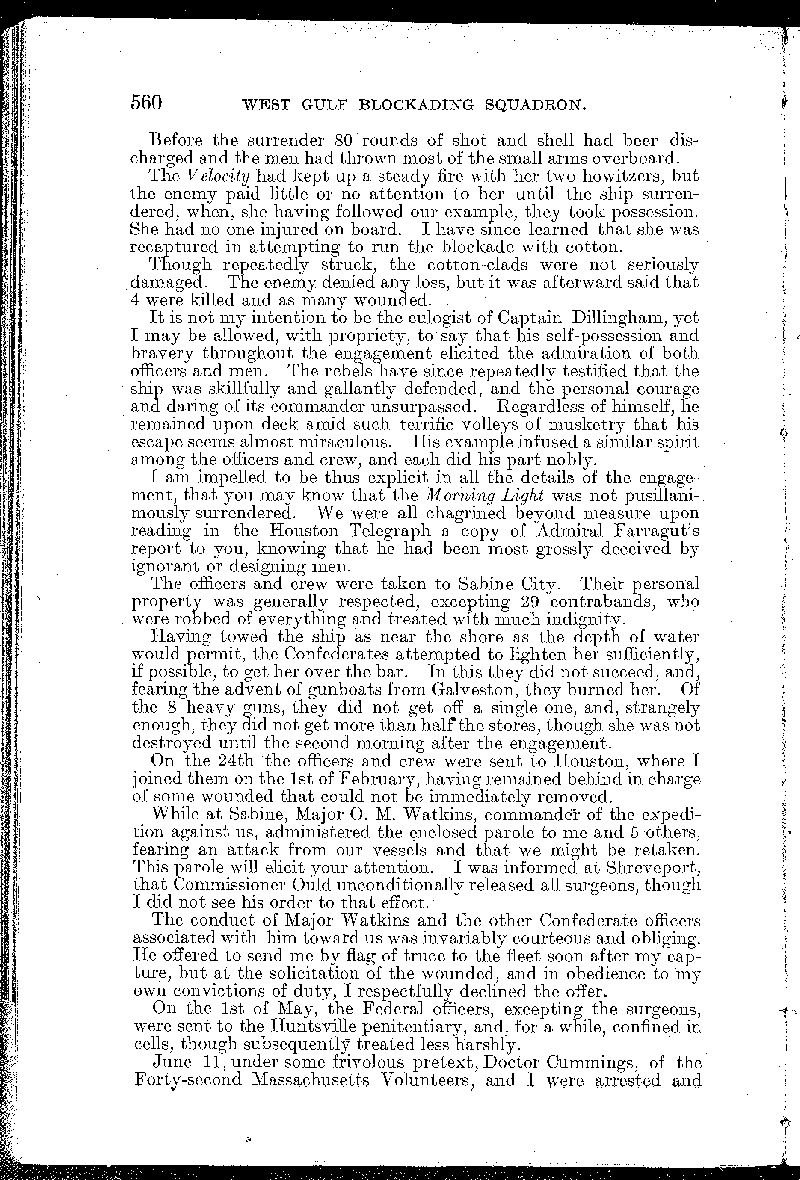
Report, dated April 12, 1864, by John W. Sherfy, U. S. Navy, Surgeon of the U. S. Morning Light when it was captured by Confederate "Cotton-Clad" steamers, to Gideon Welles, Secretary of the Navy (Page 3 of 5). This report is in Volume 19 of the Official Records of the Union and Confederate Navies in the War of the Rebellion.

(This report is continued from page 559) Before the surrender 80 rounds of shot and shell had been discharged and the men had thrown most of the small arms overboard
The Velocity had kept up a steady fire with her two howitzers, but the enemy paid little or no attention to her until the ship surrendered, when, she having followed our example, they took possession. She had no one injured on board. I have since learned she was recaptured in attempting to run the blockade with cotton.
Though repeatedly struck, the cotton-clads were not seriously damaged. The enemy denied any loss, but it was afterward said that 4 were killed and as many wounded.
It is not my intention to be the eulogist of Captain Dillingham, yet I may be allowed, with propriety, to say that his self-possession and bravery throughout the engagement elicited the admiration of both officers and men. The rebels have since repeatedly testified that the ship was skillfully and gallantly defended, and the personal courage and daring of its commander unsurpassed. Regardless of himself, he remained upon deck amid such terrific volleys of musketry that his escape seems almost miraculous. His example infused a similar spirit among the officers and crew, and each did his part nobly.
I am impelled to be thus explicit in all the details of the engagement, that you may know that the Morning Light was not pusillanimously surrendered. We were all chagrined beyond measure upon reading in the Houston Telegraph a copy of Admiral Farragut's report to you, knowing that he had been most grossly deceived by ignorant or designing men.
The officers and crew were taken to Sabine City. Their personal property was generally respected, excepting 29 contrabands, who were robbed of everything and treated with much indignity.
Having towed the ship as near teh shore as the depth of water would permit, the Confederates attempted to lighten her sufficiently, if possible, to get her over the bar. In this they did not succeed, and, fearing the advent of gunboats from Galveston, they burned her. Of the 8 heavy guns, they did not get off a single one, and, strangely enough, they did not get more than half the stores, though she was not destoyed until the second morning after the engagement.
On the 24th the officers and crew were sent to Houston, where I joined them on the 1st of February, having remained behind in charge of some wounded that could not be immediately removed.
While at Sabine, Major O. M. Watkins, commander of the expedition against us, adminstered the enclosed parole to me and 5 others, fearing an attack from our vessels and that we might be retaken. This parole will elicit your attention. I was informed at Shreveport, that Commissioner Ould unconditionally released all surgeons, though I did not see his order to that effect.
The conduct of Major Watkins and the other Confederate officers associated with him toward us was invariably courteous and obliging. He offered to send me by flag of truce to the fleet soon after my capture, but at the solicitation of the wounded, and in obedience to my own convictions of duty, I respectfully declined the offer.
On the 1st of May, the Federal officers, excepting the surgeons, were sent to the Huntsville penitentiary, and, for a while, confined in cells, though subsequently treated less harshly.
June 11, under some frivolous pretext, Doctor Cummings, of the Forty-second Massachusetts Volunteers, and I were arrested and (This report is continued on page 561)
This site is sponsored by the Friends of the Old Naval Hospital
Last updated November 9, 2008